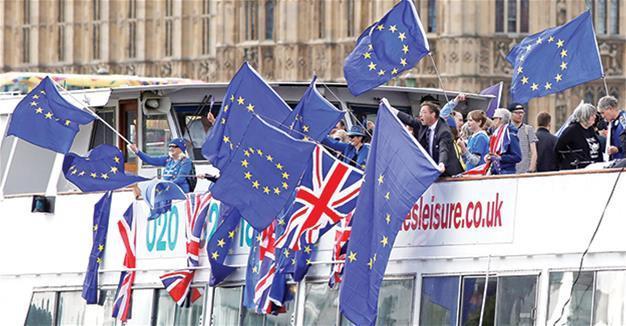UK warns European Union not to ‘drag its feet’ on Brexit
LONDON – Agence France-Presse

The European Union should not “drag its feet” in negotiating Brexit, a British government source said on Aug. 27 ahead of a fresh round of UK-EU divorce talks in Brussels this week.
“Both sides must be flexible and willing to compromise when it comes to solving areas where we disagree,” the source said.
“As the EU itself has said, the clock is ticking so neither side should drag its feet.”
The Brexit ministry in a statement also called for the European Commission to be “more flexible,” as British negotiators push for talks on future trade ties alongside the divorce.
“Conversations about our exit and the future deep and special partnership we want with the EU are inextricably linked,” the ministry said.
But the EU says there must first be “sufficient progress” on three issues -- the status of EU nationals in Britain, the bill for the divorce and the future of Northern Ireland’s border with the Irish republic.
An EU official told a press briefing on Aug. 25 that there was “a very big gap” between “where we are and where we need to be” and there was a “lack of substance” in the negotiations so far.
The official said it was “unlikely” there would be “major steps” in the coming days of talks.
The ministry said the negotiations between Brexit minister David Davis and Michel Barnier, the EU’s chief negotiator, would begin today and wrap up on Aug. 31.
The precise date for the start had been in doubt, as Aug. 28 is a public holiday in Britain.
Britain said it had shown a “pragmatic approach” in a series of position papers in recent weeks on future trade ties, the Irish border and post-Brexit dispute resolution mechanisms.
But EU officials have been highly critical of the negotiating proposals.
Technical talks
The British government source said this week’s talks would be mostly technical and would be “a stepping stone to more substantial talks in September.”
Main opposition Labour Party, meanwhile, said yesterday that Britain should stay in the European single market and accept free movement of people during a transition period after it leaves the EU.
In a major policy shift, Labour’s Brexit spokesman Keir Starmer wrote in the Observer that continuity immediately after Brexit would “avoid a cliff edge for our economy.”
“Labour would seek a transitional deal that maintains the same basic terms that we currently enjoy with the EU,” Starmer wrote.
“That means we would seek to remain in a customs union with the EU and within the single market during this period. It means we would abide by the common rules of both,” he said, meaning unimpeded immigration from the EU could continue.
Starmer added that curbs on immigration “must be addressed in the final deal” as it was a key issue in last year’s Brexit referendum.
Britain voted to leave the EU in a referendum last year and Prime Minister Theresa May issued a formal notification in March, starting a two-year negotiating timetable to exit.
 The European Union should not “drag its feet” in negotiating Brexit, a British government source said on Aug. 27 ahead of a fresh round of UK-EU divorce talks in Brussels this week.
The European Union should not “drag its feet” in negotiating Brexit, a British government source said on Aug. 27 ahead of a fresh round of UK-EU divorce talks in Brussels this week.